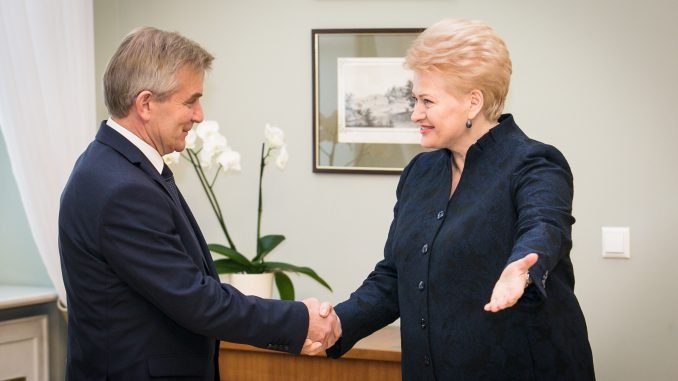
“The most pressing challenge currently is the 2017 state budget. According to the President it has to reflect both social needs and the state’s capacities, while also not breaching fiscal responsibility,” said M. Lingė.
Lithuania is committed to the European Commission to keep income and expenses balanced, but in the currently presented budget project for next year the financial deficit reaches 0.8% of the GDP. 0.6% is tied to expenses for implementing the social model and Labour Code.
The new Peasant and Greens Union based government plans to postpone the coming into force of both the new Labour Code and new social model, but no formal decision on the duration of postponement has been made. Peasant and Greens Union Chairman Ramūnas Karbauskis has spoken of the possibility of delaying the Labour Code by half a year, while the rest of the social model by a whole year.
After the amendments suggested by the President were rejected by the previous Seimas, only token changes were made to the new Labour Code. As such the possibilities of reviewing its articles were raised again, so that labour unions and employers would have an opportunity to present their concerns and proposals.
M. Lingė also urged Seimas to take up balancing the Labour Code and ensuring not only more modern labour relations, but also people’s security as soon as possible.
After meeting with the President V. Pranckietis was queried about the employer’s proposals on raising wages, if their proposals for regulating labour relations were abided by.
Such a proposal was presented to the LPGU by the Lithuanian Business Employers’ Confederation President Danukas Arlauskas. That said the proposal is not yet specific in its details, but it signals that the employers would prefer to have freer rein to accept and fire employees, as was proposed in the Social Democrat Labour Code.
Is V. Pranckietis convinced that the employers would fulfil their promises of raised wages?
“Likely yes. Currently the Labour Code was amended on November 3. There were many changes made. The employers have said they could raise wages, that way far fewer unresolved questions would be left in the Labour Code. Currently there is no such agreement. As you know the cabinet is only being formed, it should get this done. The employers are also not fully consolidated into one unit, there are several representative organisations so it isn’t possible to answer for the employers, to take their opinion as final. But you saw yourselves and declared in the public sphere that it is being done. When the cabinet is formed, we will have someone to negotiate until a final decision,” said V. Pranckietis.
“We have to, finally, trust someone. If it was signed, likely it would happen,” the Seimas Speaker concluded.
Proposing CEK and COEC reform
The head of state also directed V. Pranckietis attention to the need to form a new Central Electoral Commission (CEK), stating that she hopes renewal and ensuring effective organisation of elections from the new commission.
The current CEK has been facing criticism for its analysis of news media articles and making rulings on which of them could be viewed as free political advertising, while there were doubts that the commission had specialists of the necessary competences to make such rulings. The CEK was also criticised for the delays in presenting the results of the first round of elections, even if it is an inherently complex procedure, with votes being counted in both single mandate districts and the multi mandate district, where candidates are rated based on priority votes.
V. Pranckietis states that “all commissions should be politically uninvolved”, but could not answer how the legislation on forming the CEK should be adjusted.
According to the President’s advisor M. Lingė, the head of state expects a principled approach of the Seimas to the Chief Official Ethics Commission (COEC), which reviews the tangling of politicians’ and officials’ private and work interests.
“The parliament has all the tools to depoliticise the work of this commission and restore its reputation in the eyes of the public,” stated M. Lingė.
According to the advisor, Seimas has a number of pieces of legislative projects that have been started, but not concluded on – the long discussed Childrens’ Rights Protection Law, the delays in transferring a number of EU directives into the Public Procurement Law, stagnation in government and municipal companies, budgetary institution legislation, which has to limit the terms of leaders in the institutions.
“The President and her team are always prepared to assist and cooperate constructively,” said M. Lingė.

Be the first to comment